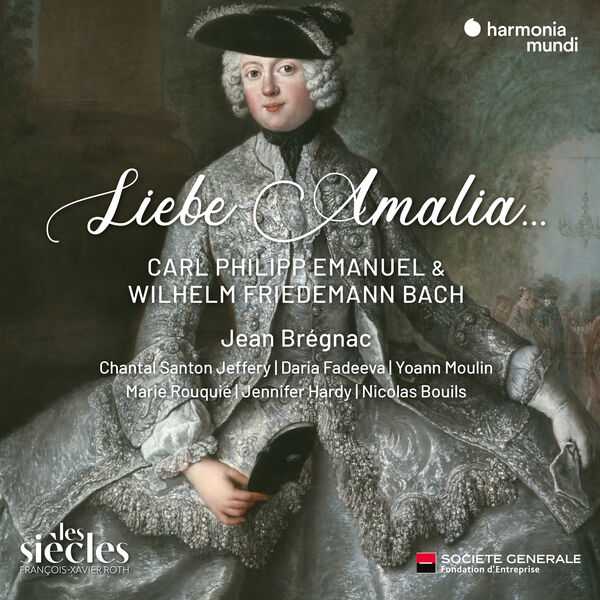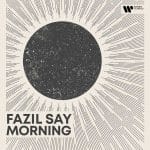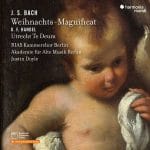

Composer: Princess Anna Amalia of Prussia, Carl Philipp Emanuel Bach, Wilhelm Friedemann Bach, Johann Philipp Kirnberger
Performer: Jean Brégnac, Chantal Santon Jeffery, Nicolas Bouils, Marie Rouquié, Daria Fadeeva, Yoann Moulin, Jennifer Hardy
Format: FLAC (tracks)
Label: Harmonia Mundi
Catalogue: HMM905378
Release: 2024
Size: 1.46 GB
Recovery: +3%
Scan: yes
01. Bach CPE: La Boehmer, H. 81, Wq. 117 / 26
Bach CPE: Trio Sonata in D Major, H. 575, Wq. 151
02. I. Allegro un poco
03. II. Largo
04. III. Allegro
05. Bach CPE: Ariette “D’amor per te languisco”, H. 767, Wq. 213
Bach CPE: Sonata in G Major, H. 137, Wq. 50 / 2
06. II. Poco adagio
07. Anna Amalia of Prussia: Lied “An das Klavier”
Anna Amalia of Prussia: Flute Sonata in F major
08. I. Adagio
09. II. Allegretto
10. III. Allegro ma non troppo
11. Bach CPE: Les Langueurs tendres, H. 110, Wq. 117 / 30
12. Bach CPE: Lied “Busslied”, H. 686 / 46, Wq. 194 / 46
13. Bach WF: Polonaise in E Minor, F. 12 / 8
14. Bach CPE: La Xenophon, H. 123, Wq. 117 / 29
15. Bach CPE: La Sybille, H. 123, Wq. 117 / 29
16. Bach CPE: La Xenophon (Da capo), H. 123, Wq. 117 / 29
17. Bach CPE: Lied “Geduld”, H. 686 / 6, Wq. 194 / 6
Bach CPE: Sonata for Solo Flute in A Minor, H. 562, Wq. 132
18. I. Poco adagio
19. II. Allegro
20. III. Allegro
21. Bach CPE: Lied “Die Liebe des Nächsten”, H. 686 / 19, Wq. 194 / 19
Kirnberger: Trio Sonata in C Major
22. I. Alla breve
23. II. Andante
24. III. Allegro
25. Bach CPE: L’Aly Rupalich, H. 95, Wq. 117 / 27
Flutist Jean Brégnac, playing a copy of a lovely, tonally precise August Grenser instrument, writes his own notes for this Harmonia Mundi release, casting the program as a fanciful narration of the life of Princess Anna Amalia of Prussia, with lighter music at the beginning and a darker mood later on. The music is not only by Carl Philipp Emanuel Bach and Wilhelm Friedemann Bach, to whom Amalia served as patroness, but also by Amalia herself, who was a composer, instrumentalist, and woman of letters admired by Voltaire, among others. Her music has been little investigated, and for listeners interested in the history of music by women, this album will be a must-have. Anna Amalia’s Flute Sonata in F major and her lied An das Klavier (an intriguing text indeed) are fully accomplished works. There are several early examples of the lied here by C.P.E. Bach as well, and these are strong draws; Mozart, another early song writer, may have known these songs. The program matches Brégnac’s concept, with early Trio Sonatas from C.P.E. giving way to his later, more irregular and ornate style. Best of all is the sheer variety of Brégnac’s program, which cuts a swath through the musical styles of Germany in the middle 18th century and includes a variety of instruments. Daria Fadeeva’s fortepiano is a fine Chris Maene copy of a Stein instrument, and there are also copies of an old harpsichord and clavichord. The result is an impressively varied collection of genres and sonorities that will keep things interesting not only for enthusiasts of this period but for any audience at all. The only real complaint is Harmonia Mundi’s church sound, which adds a lot of huffing and puffing but not much else. A standout release.



